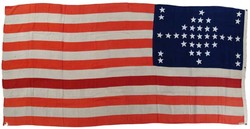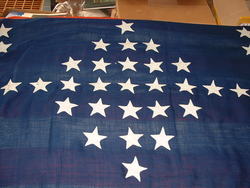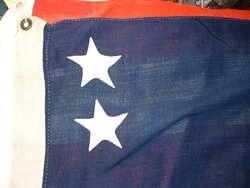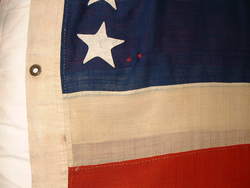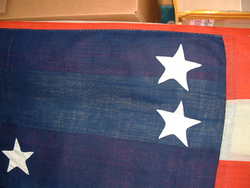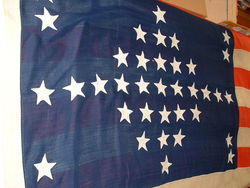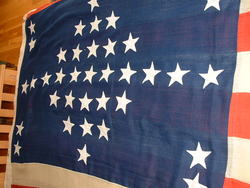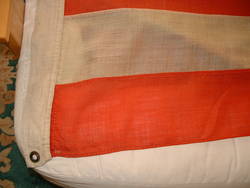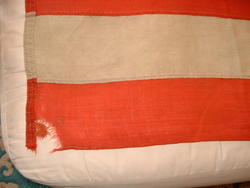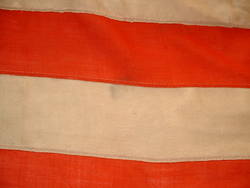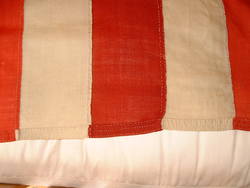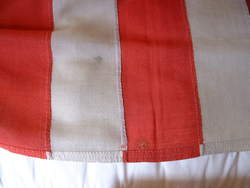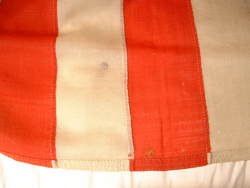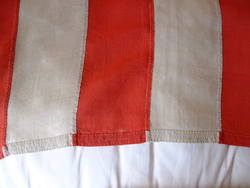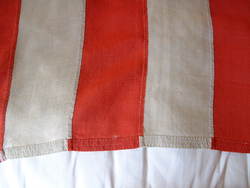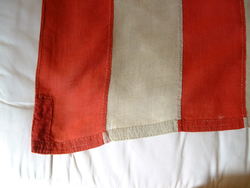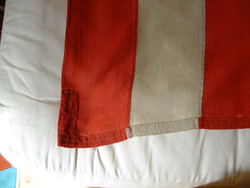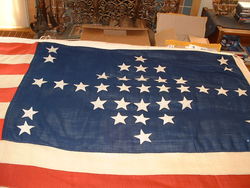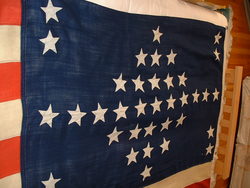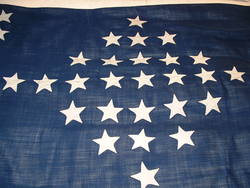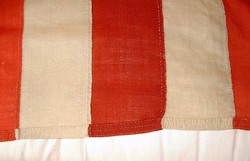U.S. 37 Star Diamond Pattern Flag - Nebraska's Admission into the Union.
This is a 37 star United States flag with the rarer diamond pattern star-field. It represents the period during Nebraska's accession to the Union from July 4, 1867, to July 3, 1877, as well as Americas 100th anniversary.
This particular flag was authorized during 'The Centennial International Exhibition' of 1876, the first World's Fair in the United States. The official name of the fair was 'The International Exhibition of Arts, Manufactures and Products of the Soil and Mine.' It took place in Philadelphia, PA to celebrate the 100th anniversary of the signing of the Declaration of Independence. The celebration took place at Fairmount Park.
This flag was originally thought to be from the 1867 to 1877 period, the usual dates for 37-star flags. However, it has since been discovered that a similar star pattern had already been manufactured as early as the summer of 1865 by General Benjamin Butler's United States Bunting Company of Lowell, MA. Butler was anticipating the imminent admission of the Nebraska Territory to statehood as the 37th state, and had manufactured the American Bunting Flag with 37 stars in a diamond star-field well in advance of statehood nearly two years later due to unforeseen last minute trouble with the state's constitution.
Months before the delay of Nebraska's admission to the Union, Butler had an audience with President Lincoln to show him a sample of this new American made bunting flag, the first american flag made of american bunting. The meeting was held on April 11,1865 included was a companion to a flag that was going to be used in the ceremony scheduled April 14th in the evening at Ft. Sumter where the first shots of the Civil War were fired upon the United States by a Secessionists' Army to commemorate the re raising of the 33 star flag by General Anderson who had lowered the original flag at the beginning of the Civil War when he surrender the fort.
President Lincoln must have understood the importance of that symbolic act marking the end of such a terrible conflict by agreeing to meet General Butler on such an occasion confirming the American spirit and creed thru the general's befitting ingenuity that the flag was made of American made bunting a first in flag making. After his meeting with Butler it must have seemed to those who attended the national tragedy was over. But ironically with a Macbeth twist, and one shot from a tiny pistol three days later, at a play titled, "An American Cousin" the President was assassinated.
A horizontal pattern of the 37 stars was also produced at that time in 1865 in time to meet the great demand during the funeral of Abraham Lincoln in April and early May 1865. It is not known if General Butler's American Bunting Flag Company was the manufacture of that style American flag. It should be noted that one with this style and star count covered the President's casket during part of the viewing in Philadelphia. See ZFC0276 a 37 star patriotic style flag which is now in the Zaricor Flag Collection.
The 37 star flag Abraham Lincoln was presented on April 11, 1865, only three days before his assassination confirms that not only were 37 star flags were made long prior to the admission of Nebraska they were made in different styles and material such as silk. It was long thought in the 20th and 21st centuries a lone 37 star count flag to have been an anomaly. But we have since learned of two other 37-star flags (ZFC0276 and ZFC0988), both of which are attributed to being at Lincoln's funeral. Thus, other manufacturers in addition to Butler were also likely making 37 star flags in anticipation of Nebraska's accession besides General Butler's flag.
This 37 star flag was formerly owned by W. Martin Jones, attorney and 1888 candidate for Governor of New York for the Prohibition Party, which sought the criminalization of alcohol sales and consumption from 1919 to 1933. The party operated at the forefront of the temperance movement and was influential in US politics in the late 19th century and the early 20th century. The Prohibition Party has nominated a presidential candidate in every election since 1872, and is thus the longest-lived American political party after the Democrats and Republicans.
Flags of this pattern were used by the United States military from 1847 to 1865. The most famous of this design are the two diamond patterned flags used at Ft. Sumter, in Charleston, SC during the Confederate siege of 1861 that started the Civil War. The flag measures 6 X 10. It is made of hand-sewn wool bunting. The canvas hoist has three brass grommets. "W. Martin Jones" is written in period ink on cotton on one end of the upper red stripe. The white cotton stars are sewn in a pattern that approximates two opposing pyramids with a horizontal line of stars spanning the length of the canton. In addition there are sets of 2 stars, stacked vertically, in each corner of the canton. There are 13 red and white stripes.
ZFC Significant Flag
Provenance:
• William Martin Jones, (1842-1906) until passing, 1906.
• By descent in Jones family until 2007.
• Sold via James D. Julia Auction, to the Zaricor Flag Collection, 2007.
Sources:
Madaus, Howard M.- Whitney Smith, The American Flag: Two Centuries of Concord and Conflict, VZ Publications, Santa Cruz, 2006.
Mastai, Boleslaw and Marie-Louise D'Otrange, The Stars and The Stripes: The American Flag as Art and as History from the Birth of the republic to the Present, Knopf, New York, 1973.
US Diamond Pattern Garrison Flags 1845-1867, Flags of Our Ancestors, 11 November 2011, from: http://www.loeser.us/flags/us_flags.html
37 Star Flag - (1867-1877) (U.S.), Flags of the World, 11 November 2011, from: http://www.crwflags.com/fotw/flags/us-1867.html
U. S. Bunting, Lowell Land Trust.Org, 11 November 2011, from: http://lowelllandtrust.org/greenwayclassroom/history/USBunting.pdf
Physical Characteristics of Antique Flags, Antique US Flag Assessment Guidelines, Dave Martucci's FLAG PAGES, 10 November 2011, from:
http://www.vexman.net/physical.htm
Image Credits:
Zaricor Flag Collection


